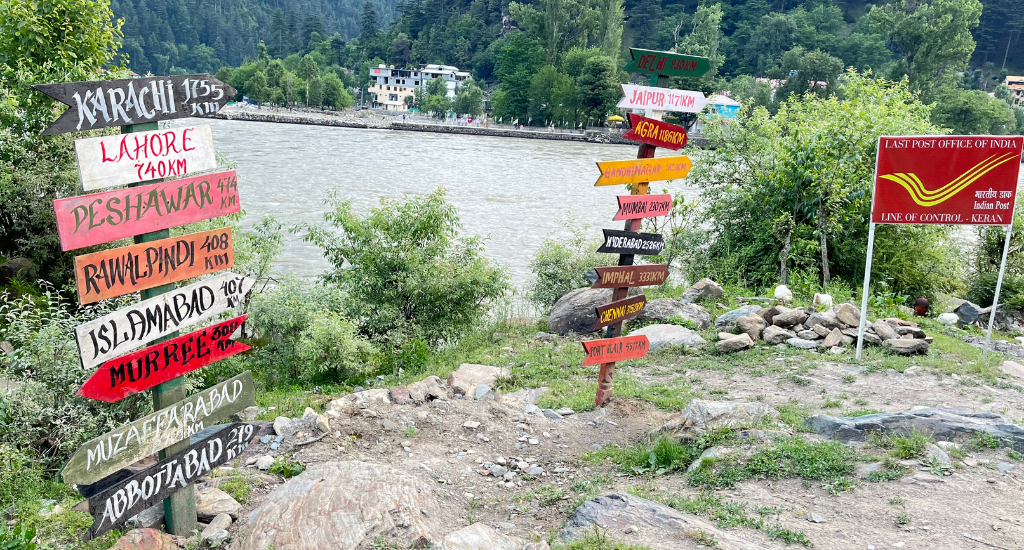The two worlds collide in one here, and no one and nothing – except the leisurely sun above and the fast-flowing Kishanganga below – enjoy unrestricted access to both sides of this heavily militarised alpine woods between India and Pakistan.
For decades, Keran village in Kupwara district of northern Kashmir was an impenetrable tranquil expanse – a silent witness to the intersection of nature, culture, and shared humanity along the Line of Control. However, Keran has opened up in recent years for tourists seeking the thrill of being one of the few to enter the final frontier where the road ends.
Keran offers a unique perspective of life and culture on either side of the border. The proximity of the two sides is such that smartphones flash two different time zones, a curious quirk for first-time visitors. Tourists engage in waving, taking selfies, and capturing the essence of daily life on both sides separated by a river – Kishanganga, also known as Neelum.

“This is a lifetime experience. I have never seen such a beautiful place offering a view of life so closely on the two sides of a border,” said Rajesh, a mountain biker from Rajasthan.
On the home front
Standing serenely on the banks of the Kishanganga, at least 21 traditional dwellings of locals transformed into homestays over the past year following the government’s decision to place Keran on the country’s tourism map. Locals opened their homes to guests to earn money, gaining a degree of financial independence and helping to revitalise their remote community and promote sustainable tourism.
As the mountains whisper tales of the borderland, Keran’s homestays share a unique tableau. Crafted entirely from wood, these homestays echo the architectural essence of medieval-era houses, infused with a touch of Central Asian design.
Also Read: 5 unique homestays across rural India
Certain homestays have fixed tourist-friendly enhancements, offering amenities such as washed and sunned bedsheets, blankets and towels, toiletries, and en suite bathrooms with hot water. And, no more squat-style toilets. These have become havens for tourists. Some also offer tented accommodations on their lawns.
Village official Majaz Ahmad anticipates more houses will be converted into homestays, crediting the active encouragement from the Indian Army. He acknowledges that without the military’s support, tourism in this remote border village would have been inconceivable.

Raja Sohail Khan, owner of Raja Homestay, said: “We are two brothers. We used to live in two separate houses. But seeing the demand for rooms, we have shifted to one house and converted the other into a homestay.” With an influx of people seeking less crowded places, these homestays are now hosting a considerable number of visitors every day. “For the past three to four months, not a single room in our homestay has remained unoccupied,” Khan said.
Feel at home
Under the gaze of the setting sun, a trio of young picnickers – Ajaz, Anis, and Hussain – find themselves at a crossroads. Reluctantly, they navigate through maize fields, pondering their overnight stay in a local house.
For the past half-hour, a persistent 12-year-old boy has insisted they lodge at his home. As they enter the ancient dwelling, reminiscent of medieval wooden structures, the aesthetic interiors and cosy floors, resonating with the symphony of the Kishanganga’s gushing waters, envelop them in nature’s embrace.
A cup of complimentary nun-chai – Kashmiri pinkish tea with a sweet, salty flavour – becomes an antidote to overcome the fatigue of their 160km journey from Srinagar to Keran.
Also Read: Rural homestays for solo, offbeat travellers
Ajaz reflected on the unexpected beauty: “I have stayed at so many places in the Himalayas, but had never thought that the place situated right at the zero line on the border would be so beautiful and mesmerising.”
Beyond the panoramic views and cultural immersion, Keran homestays become a haven for foodies and culture enthusiasts eager to explore local cuisine. Traditional meals, prepared by women using locally sourced ingredients like rice, vegetables, cornbread, ghee, curd, and various walnut chutneys, offer a gastronomic journey.

Waheeda Jan, homemaker and owner of Khan Homestay, along with her sister and mother, prepares meals for more than 20 guests every day. While many homestays adhere to the traditional practice of serving meals with people seated cross-legged on carpets, some homestays have also introduced dining tables.
Managed and owned by the local ethnic community, primarily speaking Pashtun and Pahari, these homestays offer guests more than just a place to stay. Activities range from trout fishing in the Kishanganga to early morning treks on circuits such as Mandia-Naga or Keran-Keran Bala.
Tourist Mohsin Ali expressed his enthusiasm for trout fishing as he unpacked his angling rod from his bag. “I am fond of trout and these rivers are full of it. I will definitely try my fishing skills here,” he said.
The lush green meadows and maize fields provide a picturesque setting for joggers, creating a well-rounded experience for visitors. For adventure seekers, Karen offers overnight camping amid the mountains and the rushing river.
Also Read: Unique homestays in Munsiari
The lead image at the top shows colourful signboards for both Indian and Pakistani cities indicating that Keran is the last village on the LoC (Photo by Nasir Yousufi)
Nasir Yousufi is a journalist based at Srinagar.








